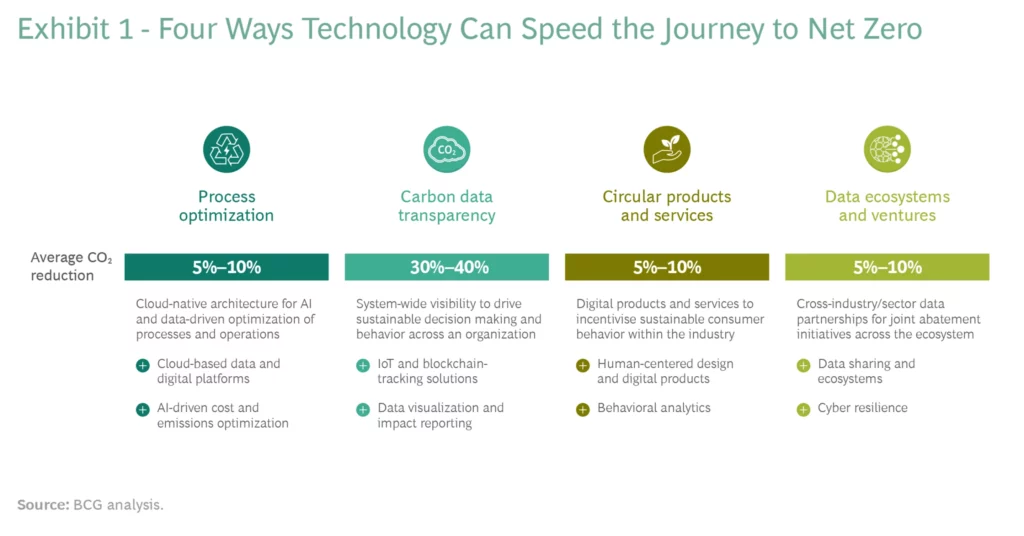As per the latest studies, more than 70% of global consumers are keen to change their consumption habits to reduce their environmental footprint. To continuously strive in the competitive world and meet customer expectations, businesses are compelled to offer services that benefit consumers and are environment-friendly.
Technology is a significant accelerator for businesses that are prepared to think widely about how to progress their sustainability initiatives. An increasing number of companies are embracing advanced technologies such as IoT, machine learning (ML), artificial intelligence (AI), data analytics, and sensors to build sustainable businesses with net zero and other environmental, governance, and social goals.
According to BCG Research, carbon data transparency, process automation, circular product or service design, and sustainable business models can help reduce emissions by 45% to 70%. Even Gartner’s article on technology trends for 2023 prioritizes investment in sustainable technology as an effective way to boost operational resilience and financial performance. The below figure depicts four ways technology can speed up the journey to net – zero:

In this blog, let us explore the key tech accelerators that enable businesses to achieve sustainability faster:
- Internet of Things (IoT) Technology:
- Digitized Operations and Offerings:
According to an analysis by the World Economic Forum, about 84% of existing IoT deployments are efficient enough to address or advance the UN’s Sustainable Development Goals. The Internet of Things (IoT) enables businesses to gather and analyze data on energy and resources, giving insights into systems, structures, and plants up to the business level. By aligning consumption with real demand, grid performance, predictions, and goals, we can measure what we use and regulate what we measure. This is where decarbonization begins, and IoT technology plays a major role here.

Digital ecosystems have a significant role in helping businesses reduce carbon emissions, consume less energy, and make effective use of energy resources. They enable end users, technology suppliers, and integrators to collaborate and share data to get new insights, come up with fresh ideas, and address issues relating to efficiency and sustainability.
Digitized operations and apps used to access essential goods and services are one example of how leading companies are transforming the customer experience and delivering sustainable growth and profit while reducing emissions using digital products and services.- Cloud Services:
Advanced digital technologies and tools such as cloud-based data platforms can help unlock new capabilities to measure and track social and environmental impact across the value chain, improve management and investment decisions, and perform better against their ESG goals. The usage of cloud services can improve the sustainability of economic, environmental, and social systems. Leveraging the elasticity of cloud service models, organizations can utilize only the resources they need, increasing the usage of shared resources and positively impacting the environment.
- Blockchain Technology:

Tracking systems driven by blockchain technology open new possibilities for measuring and monitoring social and environmental impact along value chains. In turn, businesses can enhance their management and investment choices and performance in relation to ESG objectives.
For instance, blockchain-based value chain transparency solutions ensure the reliability and security of products from the supply source through the producer to the retailer and the customer.
- AI and Advanced Analytics:
IoT- and AI-based solutions also enhance energy efficiency in real-time time, minimizing emissions and saving money all at once. Organizations use these skills to build and fine-tune offers, engage customers, and improve performance over time.
For example, a US-based bank is using such solutions to enhance financial inclusion. With a wholly digital business strategy, it has built a financial profile of potential customers using special data sources and algorithms, granting them access to credit without any charges and at 50% cheaper interest rates than other traditional banks.
CONCLUSION
According to BCG, 25% of companies effectively rebuilt sustainable business, redefining the lines of competition and addressing environmental concerns using cutting-edge technology, making a significant commitment to time, management energy, or business resources.
Do you want to learn new possibilities for your business by integrating sustainable technology into your business processes?
If you are not sure what technologies to meet your sustainability goals, then reach out to our Sustainability experts to help provide your business the technology support it needs to innovate and evolve.